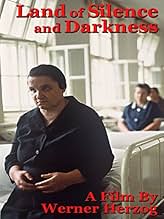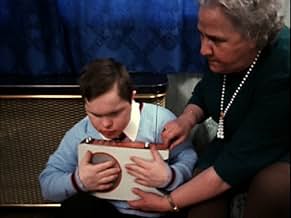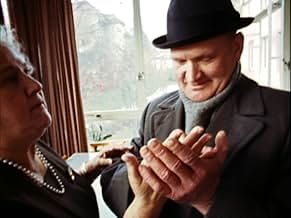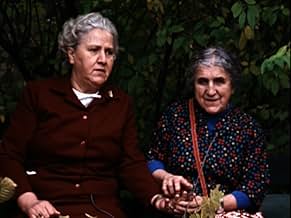Land of Silence and Darkness
Through examining Fini Straubinger, an old woman who has been deaf and blind since adolescence, and her work on behalf of other deaf and blind people, this film shows how the deaf and blind ... Read allThrough examining Fini Straubinger, an old woman who has been deaf and blind since adolescence, and her work on behalf of other deaf and blind people, this film shows how the deaf and blind struggle to understand and accept a world from which they are almost wholly isolated.Through examining Fini Straubinger, an old woman who has been deaf and blind since adolescence, and her work on behalf of other deaf and blind people, this film shows how the deaf and blind struggle to understand and accept a world from which they are almost wholly isolated.
- Awards
- 1 win & 1 nomination total
- Director
- Writer
- All cast & crew
- Production, box office & more at IMDbPro
Featured reviews
'If there were another World War, I wouldn't even notice it.'
The above quote closes the documentary Land of Silence and Darkness and in many ways sums it up perfectly. Film-maker Werner Herzog has over the years made many films – fiction and fact alike – that focus on outsiders on the extreme fringes of society. With this film, I think it could be argued that his subjects are the most remote and in some ways unknowable of all. The people in this film are all deaf-blind. The loss of these two most key senses puts them in a strange mysterious world where they are cut off from our reality. The principal character is a late middle-aged woman called Fini Straubinger who suffered a fall when she was nine, that went unreported and untreated. As a consequence of this, she gradually lost her sight and hearing so that by her teens she was deaf and blind. She subsequently spent thirty years in bed but later re-emerged and went on to focus on helping others in a similar situation. This involved teaching them to communicate and organising field visits.
Like is mostly the way with documentaries focusing on people with severe disabilities, at first the participants seem quite alien to us but as we observe them for a time they emerge as identifiably human. Fini is in a more unique position than her more famous counterpart Helen Keller, in that she lost her senses at an age old enough to remember more about them and the world around her. This has allowed her to learn to communicate via an extraordinary touch-based system. It still seems incredible for us to imagine what it must be like to be in a void without sound or vision only to intermittently feel this physical communication and moreover, to be able to actually function under these circumstances. Fini is frankly an extraordinary person and her achievements are quite astonishing. The documentary introduces us to several other deaf-blind who are in even more difficult and frankly heart-breaking situations. One middle-aged woman lives in an asylum after the only person who communicated with her, her mother, died. We also encounter some who have borne this affliction from birth. This makes it especially difficult teaching them anything, some concepts becoming completely impossible. One of the most memorable of these scenes involves a 22 year old man who has never been taught how to walk, chew or communicate. We first see him sitting on the floor buzzing strangely while violently throwing a ball about. He seems to all intents and purposes like an infant. Incredibly, once Fini interacts with him she immediately makes a communication breakthrough. There are many unbelievable scenes such as this sprinkled through this documentary and it is a film that makes you pause and not only remember how lucky you are but also to ponder what being human is actually all about.
Heavy insight into the land of nothingness
The text on the back cover explains the movie very well:
"Some who live in this land have learned to speak, though they communicate with each other by touch language: what they say comes from the most profound depths of human experience, and is often startingly beautiful and exiting. This is not a depressing movie at all. Neither is it a movie for voyeurs of the grotesque. As Anita Earle writes, 'It is, rather, a testament from another plane of existence'"
At some points in this movie I laughed. The camera often stays very long on lonely, depressing people who spend their days either sitting or lying down. But it wasn't meant to be comedy, it is a way for me to step back. It is a very 'close' picture, it really gets to you. You're thinking "Jesus", and you want to react. And still, it is an artwork.
Locked in Without Vision or Sound...
What It Means to be Human
An exhilarating answer to the question, Who is my brother?
Did you know
- ConnectionsFeatured in I Am My Films (1978)
- How long is Land of Silence and Darkness?Powered by Alexa
Details
- Release date
- Country of origin
- Language
- Also known as
- Land des Schweigens und der Dunkelheit
- Filming locations
- Production companies
- See more company credits at IMDbPro
- Runtime
- 1h 25m(85 min)
- Sound mix
- Aspect ratio
- 1.37 : 1


























